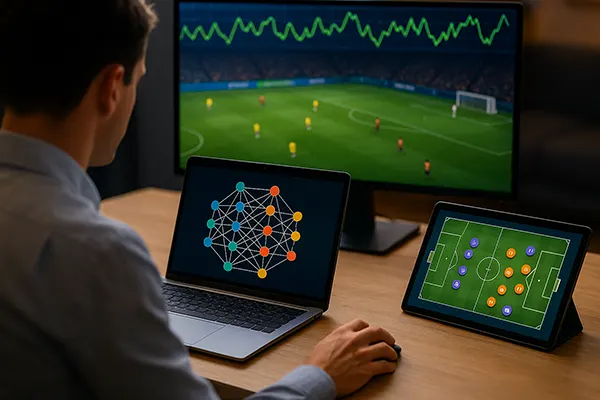The use of artificial intelligence in football match prediction has reached a new level in 2025. Among the leaders in this field are Google Gemini and Claude AI—two large language models that are now being actively explored not only by tech enthusiasts but also by betting analysts and sports data experts. But how do these AI systems compare with professional betting analytics that rely on statistical models, form evaluations, and human intuition? Let’s explore the capabilities of these tools and what they really offer when it comes to predicting outcomes on the pitch.
Overview of AI Capabilities in Football Match Prediction
Both Google Gemini and Claude AI use vast datasets and machine learning algorithms to understand and forecast match outcomes. While neither was designed specifically for sports predictions, their reasoning abilities and contextual understanding allow them to analyse variables such as team performance, player injuries, head-to-head statistics, and external factors like weather or venue conditions.
Gemini, being part of Google’s AI ecosystem, benefits from direct access to live Google Search data, making its forecasts heavily reliant on real-time news, statistics, and online sentiments. This gives it a slight edge in freshness and relevance. On the other hand, Claude AI by Anthropic is more focused on balanced reasoning and safe outputs, which can sometimes make its predictions less aggressive but more consistent.
Importantly, these models do not ‘see the future.’ Their predictions are based on probabilities derived from existing data. They operate more like analytical assistants rather than clairvoyants, interpreting large swathes of information and drawing reasoned conclusions from them.
How Google Gemini Approaches Football Predictions
Gemini leverages real-time indexed data to provide dynamic responses that adjust according to changes in player status, tactical line-ups, and betting odds. For example, if a key player is suddenly ruled out of a match due to injury, Gemini can factor this into its predicted outcomes within minutes of the announcement.
The model also includes advanced natural language understanding, which allows it to extract implications from press conferences, post-match interviews, and analyst blogs. In football, where unquantifiable factors can influence outcomes, this contextual awareness can make a difference.
However, Gemini does not operate on a closed statistical system. This means its predictions might vary with time, even for the same match scenario, as it updates its understanding based on incoming data. This can lead to inconsistencies unless outputs are time-stamped and benchmarked.
How Claude AI Offers an Alternative to Traditional Analytics
Claude AI, in contrast, is designed around interpretative safety and detailed logical chaining. While it doesn’t access real-time data as freely as Gemini, it excels in structured reasoning. Claude is particularly strong at forming consistent analytical frameworks based on match history, tactical formations, and style-of-play analysis.
This approach often mirrors how traditional betting analysts work—starting from historical performance and then adding contextual modifiers like weather or home advantage. Claude’s predictions tend to be more conservative, as the system avoids overfitting or drawing bold conclusions from ambiguous data.
Interestingly, Claude also tends to flag uncertainty or statistical anomalies more often than Gemini. For instance, in matches with strong underdog potential or limited historical data, Claude may avoid giving any outright prediction and instead present a range of probabilities or offer scenario-based analysis.
Case Study: Manchester City vs Real Madrid, March 2025
When asked to predict a high-profile Champions League clash between Manchester City and Real Madrid in March 2025, Gemini leaned towards Manchester City with a 68% likelihood of winning, citing recent home form, Pep Guardiola’s tactical superiority, and squad depth as decisive factors.
Claude, however, took a more cautious stance, assigning a 55% chance to City and emphasising the unpredictability of knockout-stage football. It highlighted Madrid’s resilience in late stages and individual brilliance from players like Vinícius Jr. and Bellingham as potential turning points.
This example shows how Claude’s logical conservatism can serve as a moderating voice, while Gemini’s real-time data interpretation lends itself to more assertive forecasting—sometimes closer to how betting algorithms operate based on live odds shifts.

Comparing AI Systems with Professional Betting Analysts
Betting analysts traditionally rely on well-established models such as Poisson distributions for goal prediction, Elo ratings for team strength, and simulations involving thousands of match scenarios. These are often paired with qualitative insights from scouts and data journalists who monitor team dynamics closely.
In comparison, AI systems like Gemini and Claude are generalists. They excel at processing multi-modal data but do not replace the depth and nuance of domain-specific human expertise. For example, a betting analyst might adjust their model manually when they observe fatigue signs in key players across multiple matches—something AI might overlook unless explicitly coded for.
Nonetheless, the AI systems can assist analysts by automating part of the data collection, synthesising reports, and even flagging overlooked variables. Their value lies in augmenting, not replacing, expert judgement.
When AI Predictions Match or Exceed Analyst Models
In matches with high predictability—e.g., top-tier teams against relegation candidates—Gemini and Claude have shown similar forecasting accuracy to bookmakers’ implied odds. This has been validated in multiple simulations run by independent sports data researchers in early 2025.
But in volatile games—like local derbies or knockout ties—AI predictions become less reliable due to the increased role of psychological and situational variables. In such cases, experienced analysts still maintain a significant edge through intuition and scenario modelling.
Therefore, AI forecasts should be treated as decision-support tools. Relying solely on them without human interpretation risks misjudging the complexity of football outcomes, especially in competitions with high variance and tactical unpredictability.
